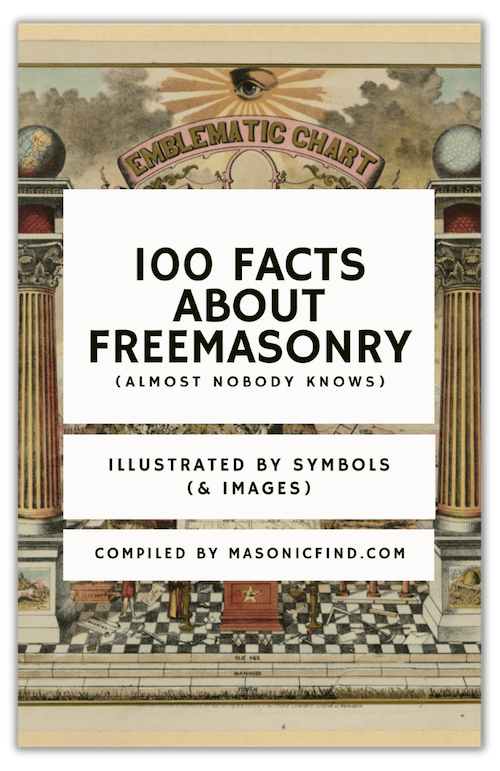Here we have been asked whether Masonic activity should be listed on a résumé or curriculum vitae.
This can be a touchy issue for several reasons.
Should Masonry be listed on a résumé or CV when applying for a job?
In general, no. However, there may be exceptions; this should be discussed with your Lodge Secretary.

My Personal Experience & Hindsight
As one who obtained the rank of Eagle in the Boy Scouts, I always list my Eagle rank under the Awards section on my résumé.
I am fairly certain that this has been the deciding factor between me and someone else in the various jobs for which I have been employed.
To obtain the Eagle rank, one has to prove himself proficient in a wide variety of skills and knowledge, render lots of service to the community, and even head a team effort for a service project.
It therefore makes sense to list the Eagle rank on a résumé since it shows leadership experience as well as the character necessary to learn and to serve others.
I also have a section on my résumé for volunteer work, under which I have included such things as church service. Because I have volunteered my time at the local Lodge, I did, at one time, include my Masonic office under this section. I have since concluded that this was a mistake on my part.
Listing your office as a Junior Deacon (or any other Masonic office) is a wholly separate ballgame from listing your Eagle rank or showing that you teach a Sunday School class.
Almost everyone knows what the Boy Scouts are and almost everyone knows what church is; not everyone knows what Masonry is. Therefore, when Masonry is listed on a résumé it will, more often than not, result in a head-scratching moment for your prospective employer.
The Eagle rank was earned over years of hard work; whereas, depending on the Grand Lodge jurisdiction, one may become a Master Mason within a single day thanks to accelerated or Grand Master’s classes.
In addition, there is the common misconception that Masons use the Craft specifically for the purpose of getting better employment than they otherwise would, and this false view hurts our Fraternity.
Mercenary Motives
“I, (name), freely and voluntarily offer myself as a candidate for the mysteries of Freemasonry and respectfully petition that I may become a member of your Lodge. I make this request unbiased by the solicitation of friends and uninfluenced by mercenary or other unworthy motives, being prompted by a favorable opinion conceived of the institution, a desire for knowledge, and a sincere wish to be serviceable to my fellow men.”
– “Petition for the Degrees of Freemasonry.” The Grand Lodge F&AM of Utah, Feb. 2009 (bold added by me for emphasis).
Mercenary as an adjective is defined by Merriam-Webster as “serving merely for pay or sordid advantage.” Synonyms for the adjective are:
- Acquisitive
- Avaricious
- Avid
- Coveting
- Covetous
- Grabby
- Grasping
- Greedy
- Moneygrubbing
- Rapacious
Mercenariness is an attribute not to be employed relative to Masonry because it is antithetical to the voluntary, charitable nature of the Fraternity.
Furtherment of a career is not a valid reason to become a Freemason; those who join Freemasonry, for this reason, are bound to be disappointed and typically end up leaving the Craft.
Exceptions for Relevant Experience

Non-Masonic Careers
I do have exceptions to my above sentiments. For example, I am currently the chairman of my Lodge’s blood drive committee; I oversee the assistance that the Lodge renders to the American Red Cross by coordinating when they can use our Lodge building for their blood drives as well as getting people signed up.
Even though this is a Masonic activity (since I coordinate such events as the Lodge’s chairman of that committee), I elect to list such participation in the Volunteer section simply as a Blood Program Leader of the American Red Cross (a designation which the Red Cross has given me).
Another example is my Lodge’s Bikes-For-Books program, which incentivizes children at local elementary schools to read more books for the chance to win a bicycle (provided by the Lodge) at the end of each school year.
Whoever heads that program might simply list themselves as the Chairman of that charity.
If it is possible to list projects without mentioning Masonry on your résumé, then that is by far preferable.
Another aspect to be wary of here is the fact that some people are avid anti-Masons.
Therefore, to list your Masonic activity on your résumé or to bring up your Masonic participation without cause during your interview could prove to be detrimental in obtaining work (even though it otherwise has literally no bearing on your non-Masonic career).
If the interviewer asks me for more details about such projects, charities, or programs, I will be completely forthright with them (as is the Masonic thing to do), including the fact that such are Lodge functions.
At that point, since the employer is requesting such information, providing it is no longer a mercenary act.
Masonic Careers
There are voluntary positions of high ranks/offices in some appendant/concordant and affiliate bodies that allow for campaigning.
If the use of a résumé or CV is at all applicable in such situations, then it is obvious that one’s Masonic history should be listed, including offices held, degrees received, awards received, appendant/concordant/affiliate bodies joined, and so on.

FREE DOWNLOAD: 100 FACTS ABOUT FREEMASONRY (ALMOST NOBODY KNOWS)
Join the 10,000+ Brethren from around the world inside our weekly Masonic newsletter and get our best selling ebook for free (usual value: $20).
Conclusion
In general, I advise against specifying Masonic participation in your résumé; by extension, I also recommend against arbitrarily mentioning in your interview that you are a Mason.
Your Grand Lodge jurisdiction may also have rules or regulations specifically prohibiting this practice.
For this reason, I advise you to check with your Lodge Secretary to ensure that such is not specifically prohibited.
Your Lodge Secretary should also be knowledgeable enough to provide a well-informed opinion on whether you should or should not.
If he does not know, then he should reach out to get the Grand Lodge’s opinion and then relay that opinion to you.
If you happen to notice that the interviewer is also a Mason (i.e., if you see that he is wearing a Masonic ring, etc.), then I see no problem, however, bringing it up to get to know him better and for him to get to know you better.
At that point, you two may learn that you have more acquaintances in common, whom he may use as additional character references to determine your character.
I personally will never specifically list Masonry on my résumés again unless they are to be provided to appendant/concordant or affiliate bodies that allow for campaigning.
If it naturally comes up in conversation during an interview or if the interviewer specifically asks me about it, however, I see no problem with talking about it.
This article was written for MasonicFind.com by Brandon Cole, SW.